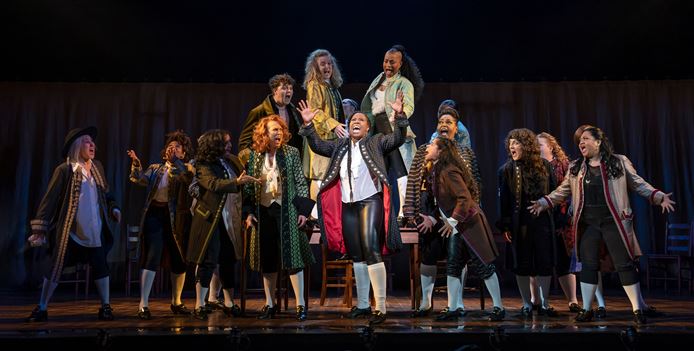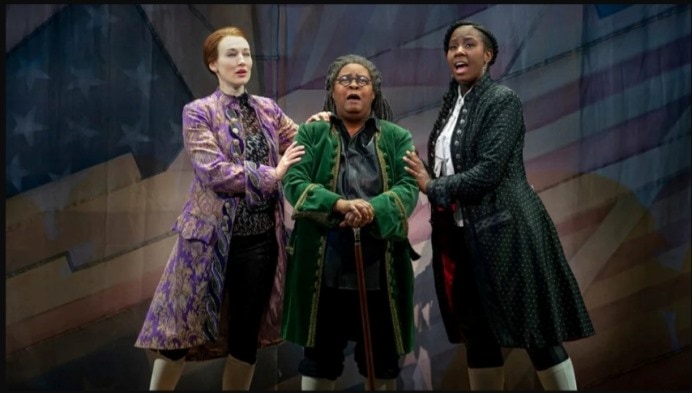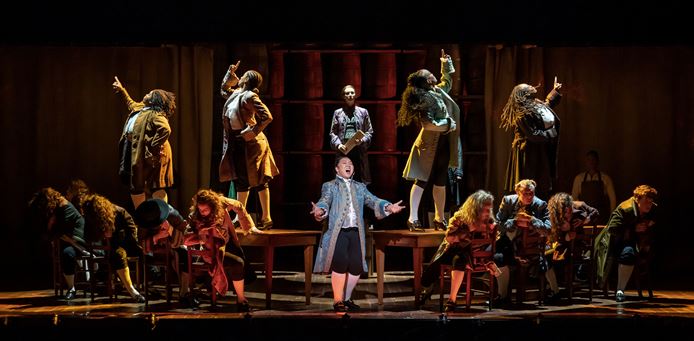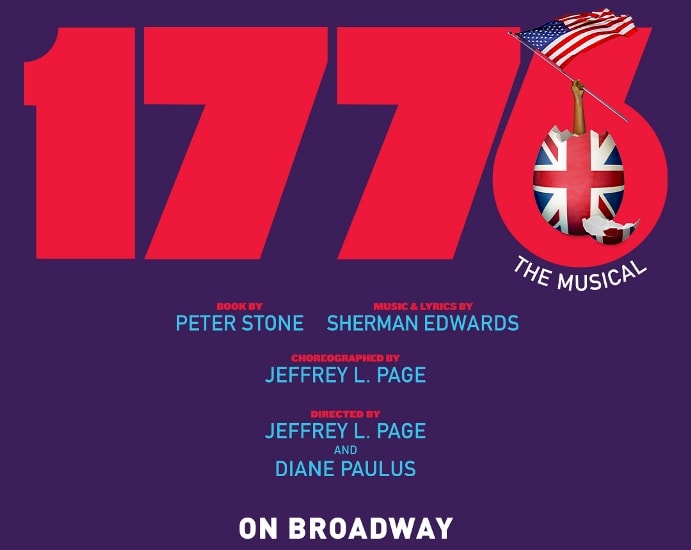When 1776, with concept, music, and lyrics by Sherman Edwards and book by Peter Stone, premiered on Broadway in 1969, with only two female roles (of Abigail Adams and Martha Jefferson, the respective wives of John and Thomas), it won the Tony Award for Best Musical. In Roundabout’s new revival, playing a limited engagement at the American Airlines Theatre, the fictionalized history of the creation of the Declaration of Independence at the Second Continental Congress in Philadelphia, co-directed by Diane Paulus and Jeffrey L. Page, takes its cue on inclusivity and diversity not from the all-male contingent that was actually there, in the place where it happened, but from Lin-Manuel Miranda’s original multiple award-winning Hamilton, by featuring a multiracial cast, here of female, transgender, and nonbinary actors in the roles of our Founding Fathers. While giving long-overdue opportunities on stage to previously under-represented communities, it doesn’t in any way alter the 18th-century narrative or offer any salient message about how things might have been different had a genderful delegation been present. As a result, the production seems more grounded in a gimmick than in a substantive reevaluation of the historical subject at hand.

The show cleverly begins with the company entering the stage in their contemporary attire, then donning period-style jackets, rolling up their leggings, pulling up their white stockings, putting on – and walking in – the shoes, lined up in pairs downstage, of the revolutionary male characters (costumes by Emilio Sosa). It then follows a determined and frustrated John Adams, representative from Massachusetts, as he tries to convince his fellow members of the divided states to debate, and eventually to ratify, a declaration of American independence from England (which he ultimately enlists Virginia’s Thomas Jefferson to write). The raucous and rowdy men disagree, confront one another, and argue loudly, and, in the lively opening group number, tell the “obnoxious and disliked” Adams to “Sit Down, John.” No spoiler alert needed here to say that he persists and, by the July 4th finale, has garnered all the names he needs on the official manuscript (preceded by a joke about how large John Hancock’s is), and the men come out, one by one, as each of their familiar signatures is projected in large scale.
A sizable company of twenty-two delivers the androcentric musical history lesson, with each actor given their moment or more in the spotlight (some in the uneven cast are excellent, some are stilted in their performances and lackluster in vocals, others overblown). In the lead is the trio of Crystal Lucas-Perry as the persistently railing and steadfast John Adams, Patrena Murray as the wise and experienced 76-year-old elder Benjamin Franklin, who frequently nods off but also offers sage advice and commitment to the cause, and Elizabeth A. Davis as an often glum Thomas Jefferson, missing conjugal relations with his spouse, dilatory in penning the central document, and exasperatedly conciliatory in making the edits demanded by the dissenters – including his momentous passage condemning slavery, which was finally removed from a text that proclaims “all men are created equal” and with the (here Adams and Jefferson bicker over “inalienable” or “unalienable”) rights of “Life, Liberty and the pursuit of Happiness” – in order to secure a unanimous vote. Adhering to the original script, and historical accuracy, there is no discussion in this present revival about women’s rights or equality.

Other featured performances are turned in by Carolee Carmello as Pennsylvania’s John Dickinson, Adams’ most staunch, vociferous, and supercilious opponent; Allyson Kaye Daniel as Abigail Adams, who joins her husband in the romantic duet harmonies of “Till Then” and “Yours, Yours, Yours” and bargains with him to have the local women mix barrels of saltpetre (a necessary component of gunpowder) for the troops in exchange for getting them the pins they want; Ariella Serur (filling in for Eryn Le Croy at the performance I attended) as Martha Jefferson, whose stellar show-stopping rendition of “He Plays the Violin” (accompanied by Davis on the eponymous instrument) relays the attraction and longing the character feels for her husband; and Sara Porkalob as South Carolina’s Edward Rutledge, who supports slavery and calls out the North’s hypocrisy for prospering from it and the Triangle Trade in the damning “Molasses to Rum.”

The opening device of the players getting into costume in front of the audience is perhaps intended to justify the show’s many anachronisms. Among them are John Clancy’s orchestrations, which encompass a high-decibel array of such post-Revolution-era styles as pop and rock; choreography by Page that includes an abstract segment of expressionist movement representing a slave auction; rapid-fire projections by David Bengali of future protests and leaders, suggesting that the struggle for independence and human rights for all is ongoing in our country; and a minimalist set by Scott Pask that confines the performance area to a shallow space (furnished only with movable tables and chairs, rather than full authentic recreations of the historic rooms, as preserved in Philadelphia) between two hung curtains (one with a faded collage of American flags) that serve as screens for the projections and are opened and closed by the cast (and also constrict the dance choreography and moves of the actors). In addition, the recurrent sexual innuendo feels dated in today’s climate and in the context of the revival’s gender-reversed casting.
While the first act of 1776 is spirited and frequently jocular, and the second act becomes increasingly serious, the overall two-hour-and-forty-minute show (the outcome of which everyone already knows) becomes redundant, begins to drag, and could use some tightening. Mostly what it could use is a greater relationship to its revisionist concept.
Running Time: Approximately two hours and 40 minutes, including an intermission.
1776 plays through Sunday, January 8, 2023, at Roundabout Theatre Company, performing at American Airlines Theatre, 227 West 42nd Street, NYC. For tickets (priced at $79-260, including fees), go online. Audience members seated in the first row of the orchestra are required to wear approved masks provided by Roundabout; all others are encouraged to wear their own masks.





